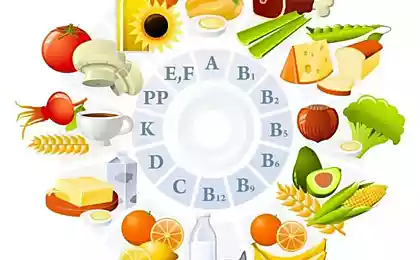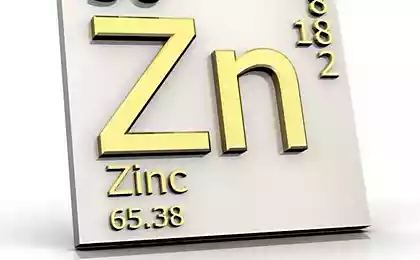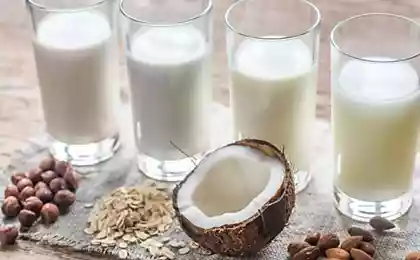199
Which products contain zinc
July is the top of the summer, the end of the holiday season and the beginning of schooling for schoolchildren and students is not far off. It’s time to put our relaxed summer idle brains together, but how do we do that?

Scientists have named products that can “feed” the brain, make it work more actively and productively. Zinc, magnesium, choline, iron and folic acid - "Site" They will tell you why they are so important and where to get them.
The role of zinc for the normal functioning of the body was much more important than was assumed 20 or 30 years ago. With the help of zinc, a number of enzymes are activated, metabolism and even the process of excitation of neurons is carried out.

Research by MD Roy Hallin in the United States showed that people who were unassembled, with a reduced ability to reproduce learned, had lower blood levels of zinc than people with high scores on intelligence tests.
Zinc mitigates the negative effect of alcohol on brain and liver cells, as it is part of the enzyme that breaks down ethyl alcohol. Without it, the synthesis of hormones, in particular testosterone, is impossible, which largely determines our behavior.
Zinc is important for the parts of the brain responsible for concentration and memory. Zinc deficiency causes irritability, sleep disorders, loss of visual acuity and smell. To improve the situation helps proper nutrition.
The daily human need for zinc is 10-15 milligrams. This useful element is found in wheat bran (7 mg per 100 g), nuts and seeds, hard cheeses (up to 5 mg per 100 g), legumes, egg yolks, meat and seafood.

But especially rich in zinc and other useful substances for the brain shrimp (40-60 mg per 100 g). They are worth including them in the diet: add shrimp meat to the salad, it is perfectly absorbed with vegetables.
Why the brain needs magnesium is indispensable for normal brain function With its participation, the number of synapses of nerve cells increases. As a result, memory, concentration, efficiency and learning are improved.

Magnesium itself is not a 100% protection against Alzheimer’s disease, but it can act as a means of prevention, reducing the likelihood of developing this disease.
Magnesium deficiency impairs the ability to concentrate and negatively affects memory and attention. To fill the daily need for 300-500 milligrams can be with the help of rich in this micronutrient food.

Among the leaders in the content of magnesium per 100 grams can be noted wheat bran (590 mg), nuts (up to 270 mg), buckwheat (258 mg), oatmeal (135 mg) and peas (100-110 mg).
You look into a book and you see... It's from chronic fatigue. The centers of the brain responsible for the perception of information, as it were, “hang” and cease to perceive new. Choline will help you put your thoughts together.

This substance improves concentration and memory, as well as improves mood, reduces the level of irritability and apathy, activates thinking processes. Initially, choline was called “vitamin B4”, but then degraded and began to be considered a vitamin-like substance. It is essentially a semi-vitamin.
It differs from vitamins only that our body can produce choline on its own. But it does this in insufficient amounts, and so we need to get choline, like other vitamins, with food.

The daily intake of choline is 500-1000 milligrams. To get it will help egg yolks (up to 800 mg), beef liver (420 mg), meat (80-130 mg), soybeans (116 mg), broccoli (40 mg), tomatoes (20-30 mg).
The role of iron in the human body cannot be overestimated. Its atom is involved in the construction of the hemoglobin molecule - a transport protein that provides oxygen transfer to all tissues.
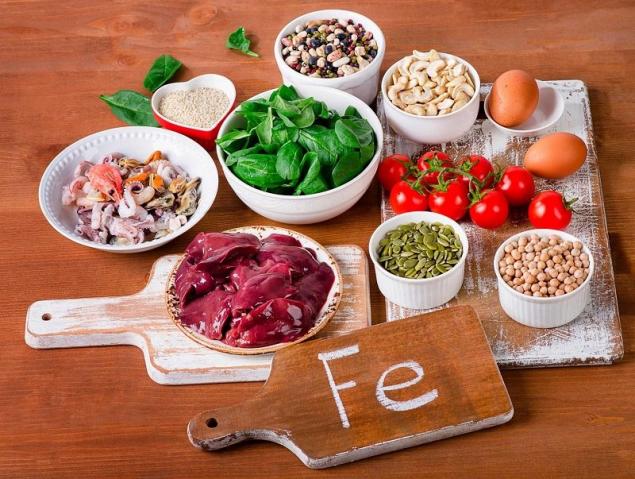
With a lack of iron, the body begins to “suffocate”. The supply of tissues with oxygen is disrupted, anemia develops, the brain, heart, nervous system suffers.
As for the nervous system, iron is needed to transmit nerve impulses from a neuron to a neuron. This occurs with the participation of special biologically active substances - neurotransmitters, and iron is involved in their formation.
Iron also affects our emotional state. It participates in the synthesis of dopamine – the “reward hormone”, which is responsible for the level of satisfaction, motivation, mental and motor activity. With a lack of dopamine, inertia, apathy is observed, clarity of thinking decreases.
Iron consumption rate It's 8 to 18 mg. According to Russian doctors, iron deficiency today occurs in every third woman, especially after 30 years.
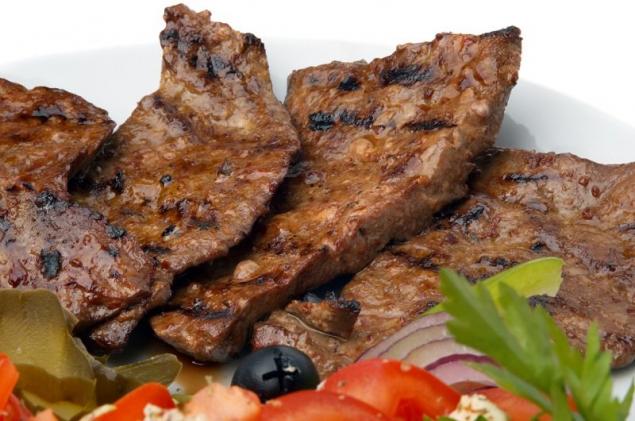
Replenish iron reserves will help sesame (16 mg), seaweed (16 mg), soy (10 mg), buckwheat (8 mg), peas (7 mg), beef liver (7 mg), dried apples (up to 6 mg). It should be noted that iron of animal origin is absorbed almost completely, and vegetable - several times worse. Some foods can interfere with the absorption of iron by the body. For example, calcium and iron are incompatible.
Doctors have long known that brain function can be seriously impaired in people who have long been deficient in folic acid (vitamin B9). Weakening of memory, irritability, distraction and forgetfulness begin to hamper mental and especially organizational work.
706130
Folic acid deficiency is very common. The champion in the content of folic acid is raw peanuts, it has as much as 240 micrograms per 100 grams of product. After eating 150 grams of peanuts, you actually get the daily allowance (400 micrograms) of the vitamin.

In second place are seeds and soybeans (200 μg), followed by parsley (110 μg), cod liver (110 μg), beans (90 μg) and Beijing cabbage (80 μg).
If the body is constantly presentbrain-fuelIn the form of vitamins and trace elements, even at a very mature age, a beautiful memory and a sharp mind are preserved. Nutrition should always correspond to mental activity. You can not overeat and malnourished, it is important to find a middle ground.
Hippocrates once said, “Tell me what you eat and I will tell you what you are sick.” To find a good figure and well-being, it is important to choose those products that bring the greatest benefit to the body.
Is it true that after 30 years, metabolism is disturbed due to natural causes? Or do we “push” the body to fade? We reveal myths and facts about metabolism together with nutritionist-nutritologist Natalia Nefedova.
Hearing loss is a real problem at any age. At the heart of the diet to improve hearing are foods that lower blood cholesterol and improve the blood supply to the inner ear. Hypocholesterol diet helps improve sound perception by 25-30 decibels!

Scientists have named products that can “feed” the brain, make it work more actively and productively. Zinc, magnesium, choline, iron and folic acid - "Site" They will tell you why they are so important and where to get them.
The role of zinc for the normal functioning of the body was much more important than was assumed 20 or 30 years ago. With the help of zinc, a number of enzymes are activated, metabolism and even the process of excitation of neurons is carried out.

Research by MD Roy Hallin in the United States showed that people who were unassembled, with a reduced ability to reproduce learned, had lower blood levels of zinc than people with high scores on intelligence tests.
Zinc mitigates the negative effect of alcohol on brain and liver cells, as it is part of the enzyme that breaks down ethyl alcohol. Without it, the synthesis of hormones, in particular testosterone, is impossible, which largely determines our behavior.
Zinc is important for the parts of the brain responsible for concentration and memory. Zinc deficiency causes irritability, sleep disorders, loss of visual acuity and smell. To improve the situation helps proper nutrition.
The daily human need for zinc is 10-15 milligrams. This useful element is found in wheat bran (7 mg per 100 g), nuts and seeds, hard cheeses (up to 5 mg per 100 g), legumes, egg yolks, meat and seafood.

But especially rich in zinc and other useful substances for the brain shrimp (40-60 mg per 100 g). They are worth including them in the diet: add shrimp meat to the salad, it is perfectly absorbed with vegetables.
Why the brain needs magnesium is indispensable for normal brain function With its participation, the number of synapses of nerve cells increases. As a result, memory, concentration, efficiency and learning are improved.

Magnesium itself is not a 100% protection against Alzheimer’s disease, but it can act as a means of prevention, reducing the likelihood of developing this disease.
Magnesium deficiency impairs the ability to concentrate and negatively affects memory and attention. To fill the daily need for 300-500 milligrams can be with the help of rich in this micronutrient food.

Among the leaders in the content of magnesium per 100 grams can be noted wheat bran (590 mg), nuts (up to 270 mg), buckwheat (258 mg), oatmeal (135 mg) and peas (100-110 mg).
You look into a book and you see... It's from chronic fatigue. The centers of the brain responsible for the perception of information, as it were, “hang” and cease to perceive new. Choline will help you put your thoughts together.

This substance improves concentration and memory, as well as improves mood, reduces the level of irritability and apathy, activates thinking processes. Initially, choline was called “vitamin B4”, but then degraded and began to be considered a vitamin-like substance. It is essentially a semi-vitamin.
It differs from vitamins only that our body can produce choline on its own. But it does this in insufficient amounts, and so we need to get choline, like other vitamins, with food.

The daily intake of choline is 500-1000 milligrams. To get it will help egg yolks (up to 800 mg), beef liver (420 mg), meat (80-130 mg), soybeans (116 mg), broccoli (40 mg), tomatoes (20-30 mg).
The role of iron in the human body cannot be overestimated. Its atom is involved in the construction of the hemoglobin molecule - a transport protein that provides oxygen transfer to all tissues.

With a lack of iron, the body begins to “suffocate”. The supply of tissues with oxygen is disrupted, anemia develops, the brain, heart, nervous system suffers.
As for the nervous system, iron is needed to transmit nerve impulses from a neuron to a neuron. This occurs with the participation of special biologically active substances - neurotransmitters, and iron is involved in their formation.
Iron also affects our emotional state. It participates in the synthesis of dopamine – the “reward hormone”, which is responsible for the level of satisfaction, motivation, mental and motor activity. With a lack of dopamine, inertia, apathy is observed, clarity of thinking decreases.
Iron consumption rate It's 8 to 18 mg. According to Russian doctors, iron deficiency today occurs in every third woman, especially after 30 years.

Replenish iron reserves will help sesame (16 mg), seaweed (16 mg), soy (10 mg), buckwheat (8 mg), peas (7 mg), beef liver (7 mg), dried apples (up to 6 mg). It should be noted that iron of animal origin is absorbed almost completely, and vegetable - several times worse. Some foods can interfere with the absorption of iron by the body. For example, calcium and iron are incompatible.
Doctors have long known that brain function can be seriously impaired in people who have long been deficient in folic acid (vitamin B9). Weakening of memory, irritability, distraction and forgetfulness begin to hamper mental and especially organizational work.
706130
Folic acid deficiency is very common. The champion in the content of folic acid is raw peanuts, it has as much as 240 micrograms per 100 grams of product. After eating 150 grams of peanuts, you actually get the daily allowance (400 micrograms) of the vitamin.

In second place are seeds and soybeans (200 μg), followed by parsley (110 μg), cod liver (110 μg), beans (90 μg) and Beijing cabbage (80 μg).
If the body is constantly presentbrain-fuelIn the form of vitamins and trace elements, even at a very mature age, a beautiful memory and a sharp mind are preserved. Nutrition should always correspond to mental activity. You can not overeat and malnourished, it is important to find a middle ground.
Hippocrates once said, “Tell me what you eat and I will tell you what you are sick.” To find a good figure and well-being, it is important to choose those products that bring the greatest benefit to the body.
Is it true that after 30 years, metabolism is disturbed due to natural causes? Or do we “push” the body to fade? We reveal myths and facts about metabolism together with nutritionist-nutritologist Natalia Nefedova.
Hearing loss is a real problem at any age. At the heart of the diet to improve hearing are foods that lower blood cholesterol and improve the blood supply to the inner ear. Hypocholesterol diet helps improve sound perception by 25-30 decibels!

